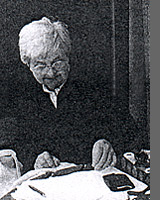| Vera Hozáková |
||
 Vera Hozáková, born on 10-28-1917 in the Czech Republic, joins the Communist Party in 1938. She is arrested for contacting a well-known, underground communist on the party's instructions. In January of 1942 she is deported to the women's concentration camp Ravensbrück. Vera Hozáková experiences liberation but remains in Ravensbrück until the end of May to care for her sick, immobilized friends. Upon her return home she marries her fiancé, who has waited for her, the very same year. She bears four children and works as an architect. Today she lives in Hradec Kralóve. Three things, according to Vera Hozáková, helped her to survive the concentration camp: poems, friendships and the hope for a future. Vera Hozáková, born on 10-28-1917 in the Czech Republic, joins the Communist Party in 1938. She is arrested for contacting a well-known, underground communist on the party's instructions. In January of 1942 she is deported to the women's concentration camp Ravensbrück. Vera Hozáková experiences liberation but remains in Ravensbrück until the end of May to care for her sick, immobilized friends. Upon her return home she marries her fiancé, who has waited for her, the very same year. She bears four children and works as an architect. Today she lives in Hradec Kralóve. Three things, according to Vera Hozáková, helped her to survive the concentration camp: poems, friendships and the hope for a future. |
The little bird, together with the barbed wired and the wall, mark the boundary of freedom of movement. The bird and its singing become a symbol of freedom and self-determination for the self. The connection of the images of spring with the self at a place of imprisonment occurs in the mouth - it "felt the spring in the mouth." A (re-)awakening of the paralyzed self is the result. The mouth is the symbolic expression of a sensual experience and stands pars pro toto for a communicative act attesting this experience, thereby surmounting for this one moment not only the camp boundary but also the limitation of a faceless and paralyzed self. The poem becomes a vessel for this experience and facilitates a memory within a verbal penal system. Constanze Jaiser |
|